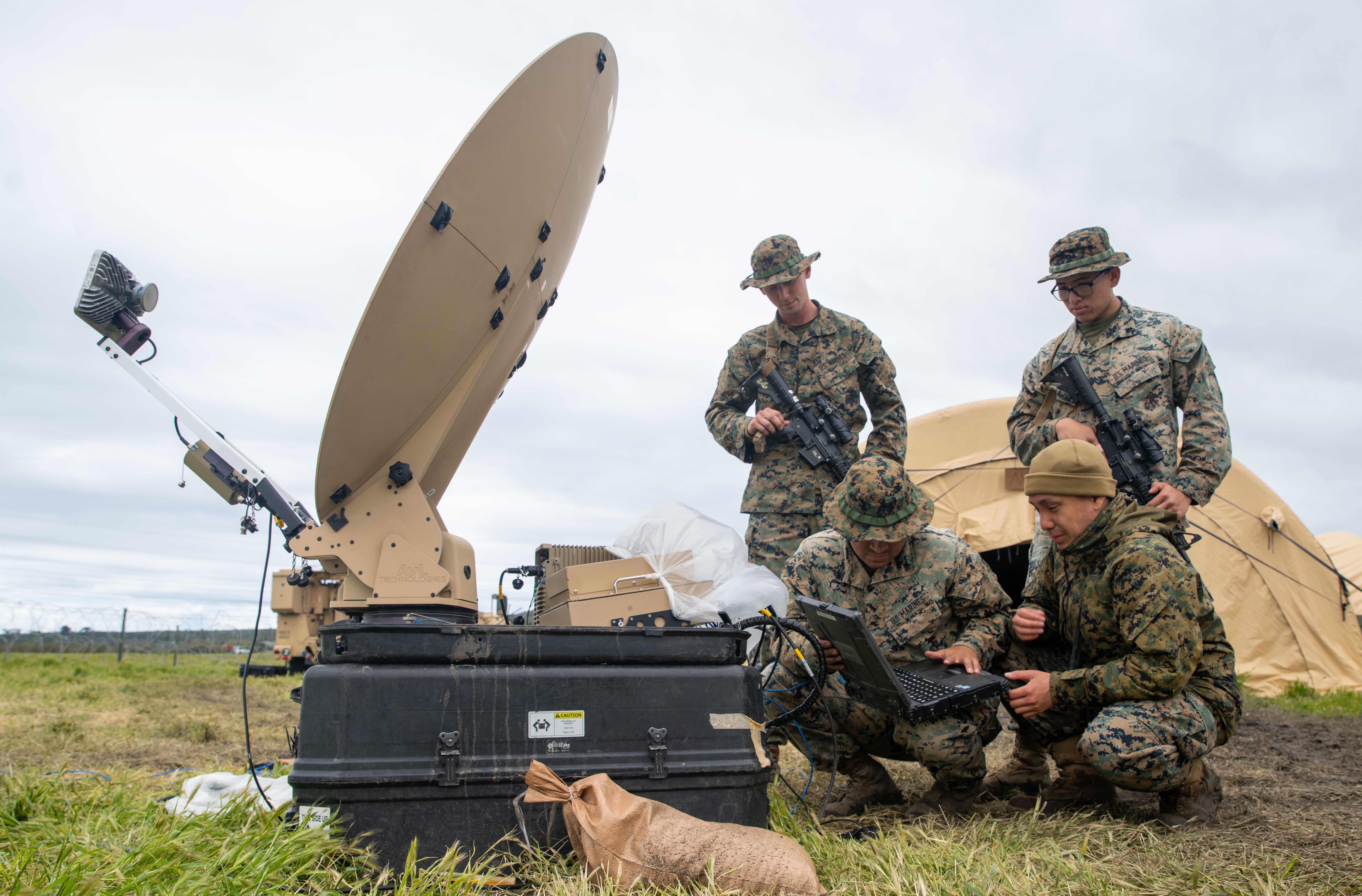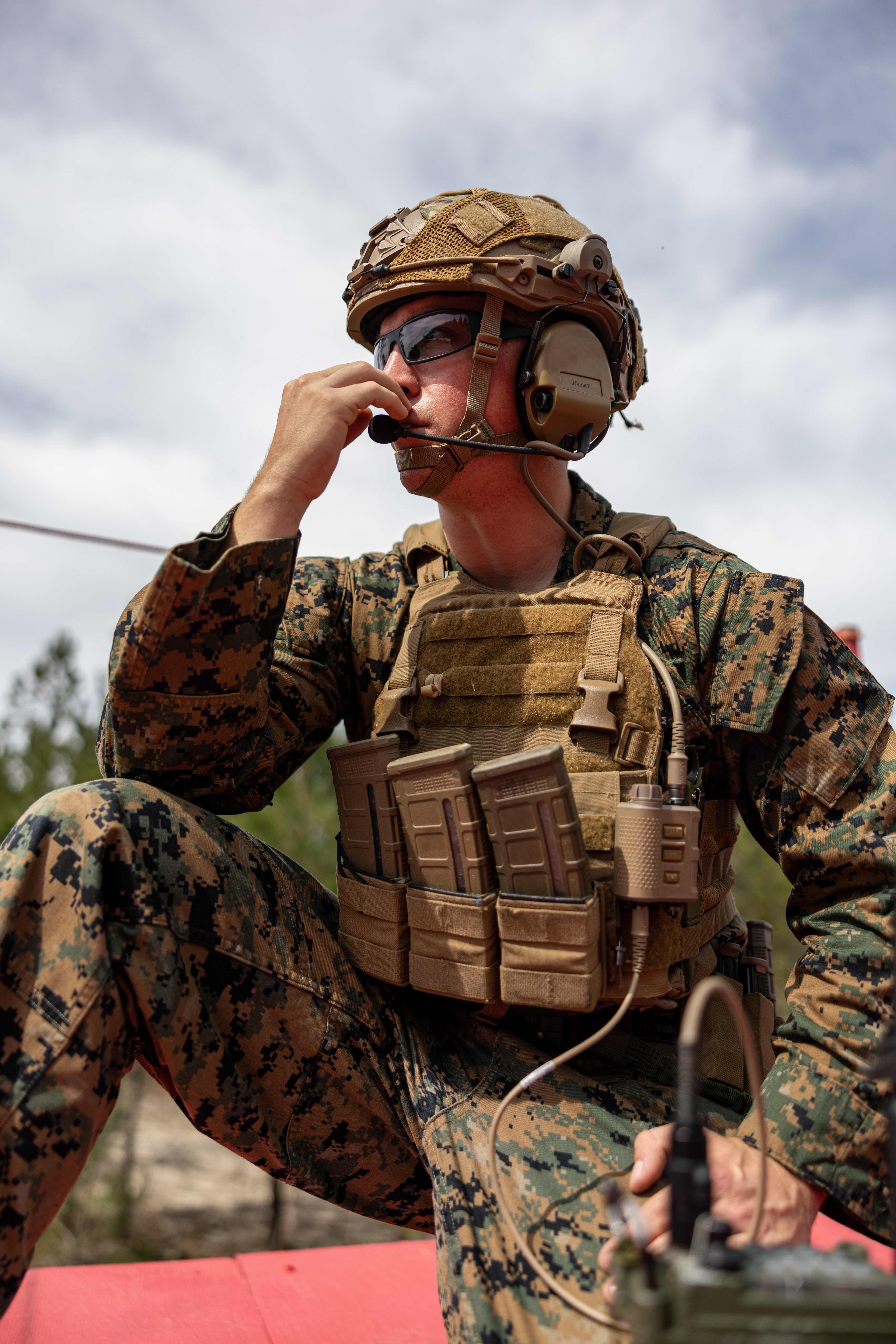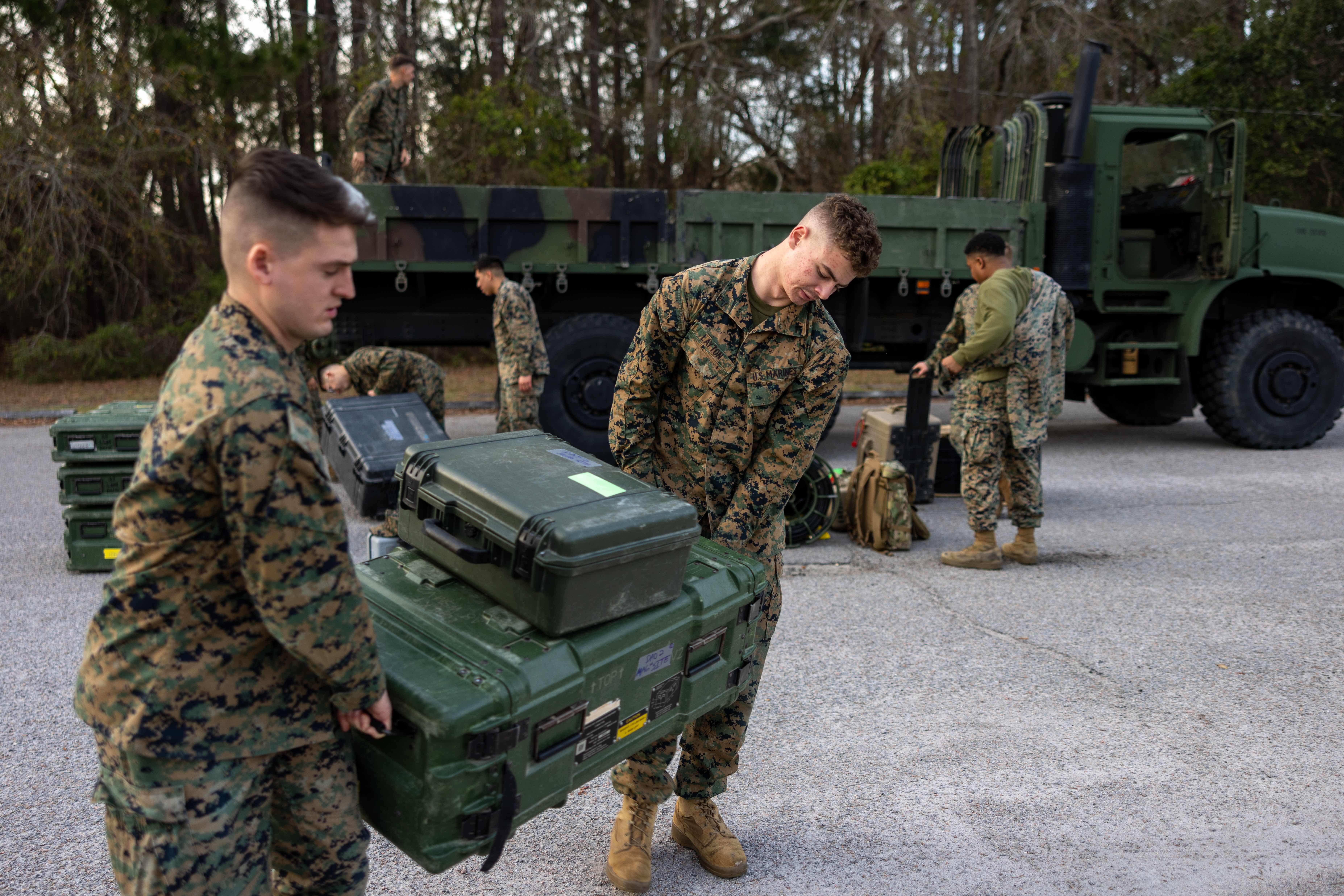
SAN DIEGO – Expeditionary communicators will be critical to the command and control of small Marine Corps units dispersed across far-flung islands in contested terrain, service officials say.
Those Marines will need to travel light, be nimble and have the capability to provide their commanders with continuous and seamless communications and networks, even in the face of threats and under fire.
The future fight won’t have the fixed, forward operational bases that deployed units over the last 20 years of conflicts relied on for support. Communications Marines will find themselves in a markedly different environment – and with a lot more responsibilities on their shoulders.
“You need somebody who can do lots of things” and who can think on their own, is physically fit and is innovative, Paul Stokes, the Marine Corps Communication and Electronics School’s deputy operations officer, told an audience earlier this month at the WEST 2023 conference, hosted by the U.S. Naval Institute and AFCEA. “Those are all skills that have to take time to develop … We’re talking about somebody who can operate in any kind of domain.”
But that expeditionary communicator doesn’t exist, yet.
No current course provides the training to build those skillsets and create the tech-savvy Marine who can do all that. For the past decade, communications Marines have worked in one of three main tracks: Data, transmissions and networks. But the Marine Corps is looking to change that, as requirements must evolve to adapt to the future expeditionary environment and support the restructured Marine Corps driven by Force Design 2030, officials say.
“You really don’t have the luxury of having three or four guys all doing the same thing,” Stokes said. Rather, the small-unit leader might have just one or two Marines skilled in all those areas handling their communications, a likely scenario for the future company landing team moving by air.
Following guidance from the Marine Corps’ director for information, command, control, communications and computers (IC4), MCCES and its Communications Training Battalion last year created a pilot course to develop those Marines into a jack-of-all-trades role as an expeditionary communicator. That Marine is a leader who’s effective in any domain – sea, land, air, cyber and space, according to the MCCES presentation, and “self-reliant and capable of operating and maneuvering across distributed operational environments.”
“The idea is to develop a leader who’s tactically and technically proficient and somebody who can operate in a whole variety of environments,” Stokes said, adding “that’s quite a tall order.”
School officials used the Marine Corps Special Operations Command’s model developing special operations communicators as a guide, he said. All 16 Marines who attended Expeditionary Communications Proof-of-Concept Course 1-23 – held Oct. 3, 2022 to Nov. 22, 2022 at the Marine Corps Air-Ground Combat Center in Twentynine Palms, Calif. – completed the course.
Developers are tweaking the instruction for a second proof-of-concept class that starts Sept. 11, 2023. School officials hope that by next year, with approvals from Marine Corps headquarters, the first class of up to 30 students will report to the desert base for the new and permanent Expeditionary Communications Course. That resident course, as envisioned, will run for 75 to 80 days and will be offered to corporals, sergeants, staff sergeants and gunnery sergeants, officials said.
That’s more than double the 37 training days during the initial pilot, which included attendees ranging from corporals and sergeants in the target military occupational specialties: 0621 transmission systems operator, 0631 network administrator, 0671 data systems administrator, 0627 SHF satellite communications operator and one Marine assigned 28XX.
Course Vision

The goal of the new course “is to combine the critical skillsets from the 062X, 063X and 067X MOSs to support expeditionary communications skillsets as multi-disciplinary independent operators, in support of Force Design, (Expeditionary Advanced Base Operations) and similar concepts,” according to an MCCES presentation slide. “This will allow commanders at all levels [to] possess the organic capability to exercise command and control, in any environment across the full range of military operations, in the smallest formation.”
What’s envisioned is a team of two Marines who set up and operate communications from the team and squad level up to a battalion-sized, forward command operations center. They are “tech-savvy” and up-to-date on the latest in communications systems, and they understand the peer threats in whatever denied, degraded and contested environment they find themselves in.
For the proof-of-concept course, instructors assigned students to two-person teams, replicating their likely future employment within small units. The instruction reflects their responsibilities to plan, install and secure the network, and then operate and maneuver the network in all domains, regardless of challenges at hand. Broken antenna? Source another one. System down? Find another means. They also learn to assess and maintain the network to ensure continuous operation and mission success.
The first pilot course, with 16 students, was designed to be small and manageable, within MCCES’ existing resources. The school got “no funding, no extra bodies. We’ve done all this out of hide,” Col. Joseph Broome, MCCES commander, told USNI News after the presentation. The initial success of the first course has bolstered instructors and developers, he said, adding that “we are looking at how do we make the next one better.”
“Networking continues to evolve, so our MOSs have to continue to evolve,” Broome said.
Students in the proof-of-concept class learned about expeditionary and small-unit communications, network fundamentals, satellite systems and tactical radio systems. The course, which included lectures, guided discussions, practical applications and tactical decision games, culminated in a final, four-day field exercise. Ahead of that culminating event, students spent several days planning for those expeditionary conditions and practiced breaking out, using and packing the equipment and tactical assault kit they would use.
“From day one, we talk about the mentality from a denied and degraded C2 environment,” Maj. Toby Pope, a course developer, told the WEST audience, “and how that requires us to be thinkers and doers in a different way than in the past.”
Students “walked away from the course having a completely different mindset,” he said. “You can’t get that from a networker that just takes some additional radio [lessons].”
The 16 students were a small cross-section of corporals and sergeants across the Marine Corps: Six from I Marine Expeditionary Force, two from II MEF, one from Marine Corps Forces Pacific and seven from III MEF, the latter of which included five Marines with 3rd Marine Logistics Regiment.
All were set to deploy overseas or to service-level training exercises, Pope said. “That is intentional, because we are using that in our feedback cycle to refine the next proof-of-concept” course.
The course isn’t meant for an entry-level Marine “because there’s too much theory, there’s too much practice” required, Broome said. Ideally, the Marine coming to the course has at least two to three years of operational experience, plus “they’re showing aptitude and a drive for this” and after another operational tour would get advanced training and reenlist. “I want to get some reinvestment out of them,” he said. “I’m looking at second term and on, and I would love for this being their primary MOS.”
Fitter Communicators

“There is Fleet [Marine Force] buy-in – especially on those we support – on us being physically fit. We’re going to sustain that,” Pope said. He recalled one infantry leader, when asked what he needed from communicators, who “said, ‘I need somebody that can keep up. Because most of the time, comm cannot keep up.’”
So course developers created the instruction with the new experimental infantry battalion in mind and incorporated physical training into every phase of instruction. Students spent more time out of the classroom and in the field in scenarios from urban to austere. The slide presentation showed images of students at computer monitors in classroom labs and students in the field carrying rucks and setting up equipment, including mobile command-and-control platforms.
“Really, for us, this is part of being communicators … being able to keep up with those that we are supporting,” Pope told the audience. “If we can’t keep up, then we are useless. Period.”
“So throughout the course, we did rucks, we did hikes, we did water PT, we swam,” he said. “All this to make the Marines better and to be a complete communicator.”
The Marines “had to ruck in to their place. They had to have everything in their packs and on their back,” he said. “They had to think of, okay, what am I putting in my pack first? Is it the radio? Is it the antenna?” At times, students forgot to pack needed gear, he added.
The course marks a big change from what communications Marines have done, but “it’s what we need to be,” said Pope. “These events simulate a lot of the expected stuff in our future.”





